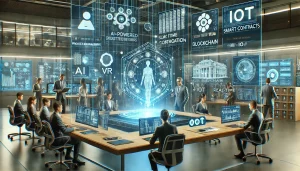
What if your project management tools could predict problems before they arise, adapt to your workflows seamlessly, and enable collaboration across time zones as if everyone were in the same room?
This isn’t a future aspiration, it’s where project management is heading in the next five years.
PM tools are set to evolve rapidly, powered by AI, VR, blockchain, and IoT. These technologies won’t just improve how we manage tasks, they will redefine collaboration, accountability, and decision-making.
This isn’t business as usual. It will be a complete shift in how we operate. Here’s how these advancements will shape the future and what it means for project managers.
AI: Predict, Automate, Optimise
AI is turning PM tools into powerful, decision-driving engines.
- Anticipate Risks: AI will analyse data patterns to identify potential bottlenecks, resource shortages, and delays before they impact delivery.
- Actionable Insights: AI won’t just flag problems, it will recommend solutions, helping PMs make smarter, faster decisions.
- Focus on Strategy: Administrative tasks like updating schedules and generating reports will be fully automated, freeing project managers to focus on high-value activities.
Why You Should Care: AI will turn PMs into proactive leaders rather than reactive managers. The ability to predict and prevent issues before they happen will completely change the role of a PM.
VR and AR: Collaboration, Visioning, and Risk Analysis
Technologies like Virtual and Augmented Reality are not only breaking collaboration barriers but also becoming indispensable tools for visioning, testing, and mitigating risks in project management.
- Virtual Collaboration Without Borders: Teams will be able to step into a shared virtual workspace, interacting with 3D project models as if they were in the same room.
- Stakeholder Buy-In, Simplified: VR will allow stakeholders to see, explore, and interact with project plans before execution, improving clarity and reducing costly misunderstandings.
- Visioning for Big-Picture Goals: Teams will experience the finished project before it even begins, ensuring better alignment and expectation-setting.
- Testing in a Risk-Free Environment: PMs will be able to simulate real-world conditions to stress-test projects, identify weak points, and refine plans.
- Advanced Risk Analysis: Virtual models will allow for early detection of potential risks, so mitigation strategies can be tested and adjusted before they impact execution.
- Immersive Training & Onboarding: AR-driven training will help upskill teams faster, ensuring everyone is fully prepared before they start working on a project.
Why You Should Care: From visioning and testing to collaboration and risk analysis, VR and AR provide project managers with tools to anticipate challenges and deliver precision, innovation, and confidence at every stage of the project lifecycle.
Blockchain: Building Trust Through Transparency
Blockchain is redefining accountability and security in project management.
- Immutable Records: Every decision, contract, and milestone will be securely recorded, creating a tamper-proof trail of accountability.
- Smart Contracts: Automated milestone-based payments will reduce disputes and ensure compliance.
- Global Collaboration: Decentralised platforms will enable secure partnerships across borders while maintaining data privacy.
Why You Should Care: Trust becomes effortless when transparency is built into the system.
IoT: Real-Time Visibility
IoT is bringing unprecedented visibility to projects involving physical assets.
- Dynamic Monitoring: IoT devices will provide live data on equipment, resource utilisation, and environmental conditions, enabling agile responses.
- Proactive Risk Mitigation: Real-time insights will allow PMs to address logistical and safety risks before they escalate.
Why You Should Care: Real-time data means real-time decisions, keeping projects on track and under control.
Personalisation: Tools That Adapt to You
The future of PM tools is all about user-centric design.
- Tailored Interfaces: Dashboards will adapt dynamically to individual roles and priorities, presenting only the most relevant information.
- AI-Powered Learning: Embedded AI will offer real-time guidance on tool features, ensuring teams can unlock their full potential with minimal effort.
Why You Should Care: When tools work for you, not the other way around, productivity thrives.
Upskilling: The Key to Thriving in This New Era
As these technologies reshape project management, the role of the project manager must evolve too.
- Learn to Leverage Technology: PMs must understand how to apply AI, VR, blockchain, and IoT to enhance project outcomes.
- Embrace Continuous Learning: Staying ahead will require ongoing education and training to adapt to emerging tools and methodologies.
- Lead Through Change: Beyond mastering technology, PMs must guide their teams through this transformation with vision and clarity.
Why You Should Care: The tools are only as effective as the people who wield them. Upskilled PMs will be the driving force behind successful projects in this new era.
Preparing for the Future
To lead this transformation, organisations need to act now:
- Adopt Early: Start experimenting with emerging technologies on smaller projects to build expertise.
- Upskill Your Teams: Invest in training programs that empower PMs to harness the full potential of new tools.
- Redefine Processes: Align workflows and methodologies with the capabilities of next-generation PM tools.
Are You Ready to Lead the Way?
This is much more than just a technological shift, it’s a leadership moment. The next five years will redefine how projects are managed, and the PMO’s and organisations that embrace this change will set the standard for innovation and success.
The question now isn’t whether these technologies will impact you, it’s whether you’ll be ready to lead with them.
Have you started preparing for the transformation of project management?
